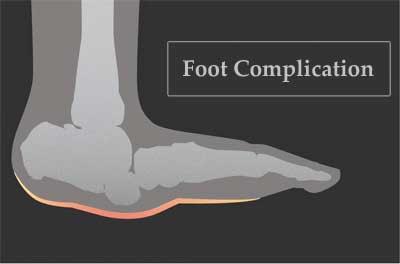- Home
- Editorial
- News
- Practice Guidelines
- Anesthesiology Guidelines
- Cancer Guidelines
- Cardiac Sciences Guidelines
- Critical Care Guidelines
- Dentistry Guidelines
- Dermatology Guidelines
- Diabetes and Endo Guidelines
- Diagnostics Guidelines
- ENT Guidelines
- Featured Practice Guidelines
- Gastroenterology Guidelines
- Geriatrics Guidelines
- Medicine Guidelines
- Nephrology Guidelines
- Neurosciences Guidelines
- Obs and Gynae Guidelines
- Ophthalmology Guidelines
- Orthopaedics Guidelines
- Paediatrics Guidelines
- Psychiatry Guidelines
- Pulmonology Guidelines
- Radiology Guidelines
- Surgery Guidelines
- Urology Guidelines
Study: Two-thirds of clinicians lack knowledge of diabetes related foot complication

ANN ARBOR : Diabetes can have several complications, including one common side effect: foot damage. Although some types are common, others are rarer.
Among the lesser-known conditions is Charcot neuroarthropathy.
"It is a rare foot condition that can cause significant deformity, disability and may lead to ulcerations and infections if it is not caught early in the disease process," says Brian Schmidt, D.P.M., clinical instructor in internal medicine and member of the podiatry team at Michigan Medicine.
Commonly known as a Charcot foot and/or ankle, the effects can be debilitating.
"The joints of the foot break down, with fracture and dislocation, leading to a rocker bottom foot deformity over time," Schmidt says. "People with peripheral neuropathy are at risk of developing this condition, and this condition is most commonly seen in patients with diabetes mellitus. However, any patient with peripheral neuropathy is at risk."
Many doctors, however, aren't up to speed on the matter.
Schmidt is the lead author on a new study, published in Clinical Diabetes and Endocrinology, that investigated how much non-foot-specialist clinicians know about the condition in an effort to understand how to better focus future educational forums on the topic.
Of the 400 endocrinologists, internal medicine physicians and family medicine physicians who responded to a survey, more than two-thirds of respondents 67.6 percent described themselves as having poor or complete lack of knowledge of Charcot neuroarthropathy. Researchers also investigated how referring physicians treat the condition if they encounter it.

Disclaimer: This site is primarily intended for healthcare professionals. Any content/information on this website does not replace the advice of medical and/or health professionals and should not be construed as medical/diagnostic advice/endorsement or prescription. Use of this site is subject to our terms of use, privacy policy, advertisement policy. © 2020 Minerva Medical Treatment Pvt Ltd